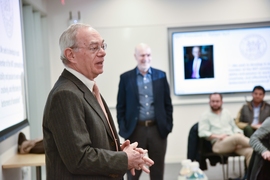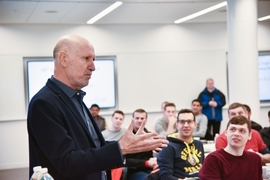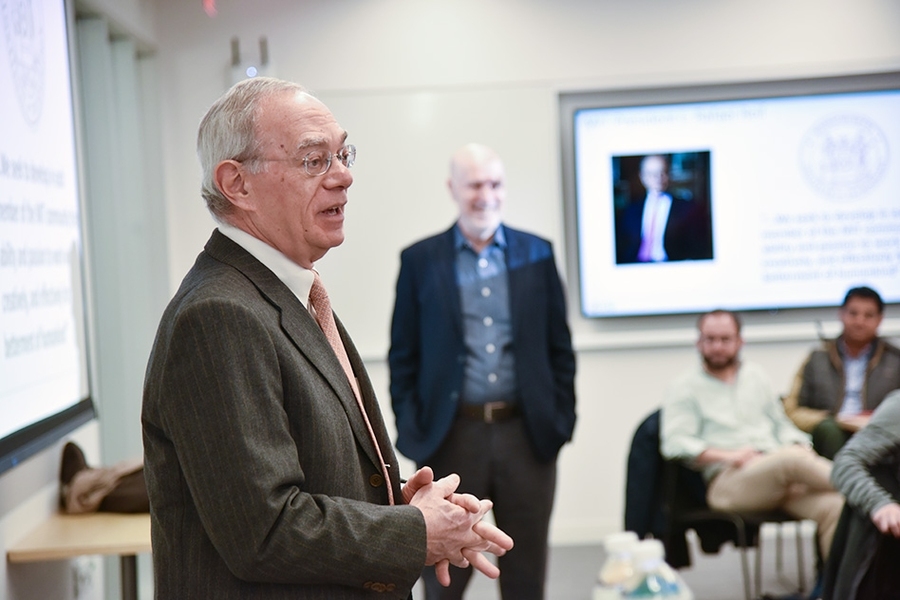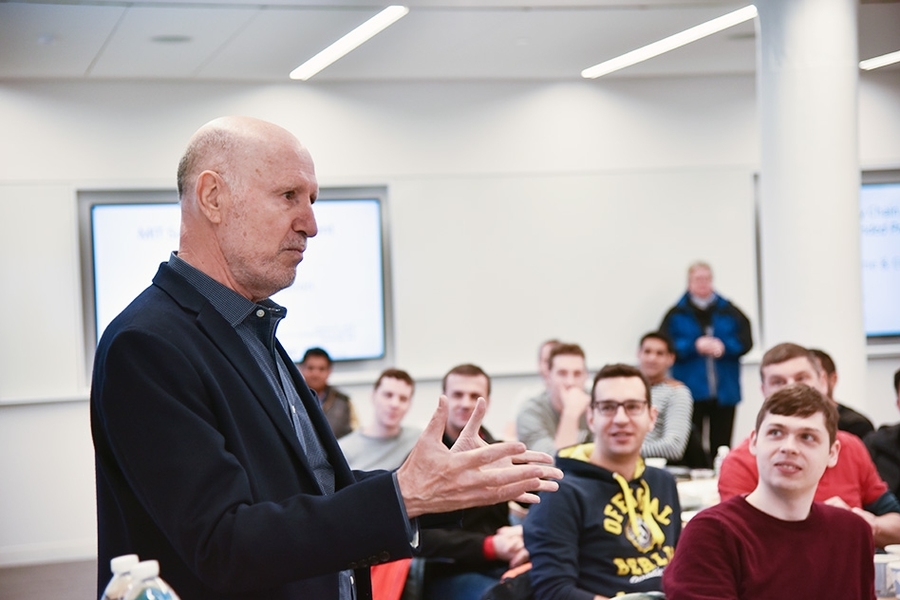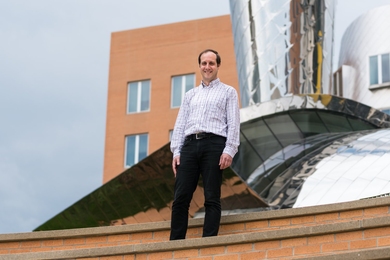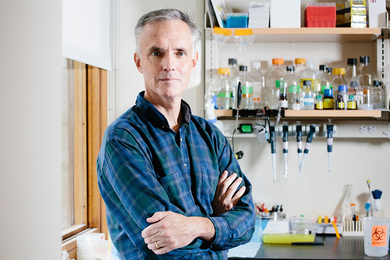In early January, 40 students from around the world landed in Cambridge, Massachusetts, to embark on their first semester at MIT. Though it was the first time they had set foot on campus, they weren’t new to MIT courses by any stretch.
After completing the online MicroMasters program in supply chain management (SCM) offered by the MIT Center for Transportation and Logistics (CTL) and by MITx through edX, passing a comprehensive exam, and making it through a demanding admissions process, these eager learners were simply taking the next step on their career journey: earning a full masters degree from MIT.
These students also happen to be pioneers. They make up the inaugural cohort of the blended SCM (SCMb) program, which allows students to apply online course credits toward a masters degree — one that is identical to that received by full-time residential students.
More than 1,900 learners have completed the rigorous MicroMasters slate of five courses; of those, 622 have passed the comprehensive final exam to earn the credential and qualify to apply to the SCMb program.
“Each of the five SCx courses in the MicroMasters curriculum is an intensive 13-week program,” says Chris Caplice, director of the SCM MicroMasters program and executive director of the MIT Center for Transportation and Logistics. “Completing it takes a lot of grit, personal effort, and determination.”
An intense semester in Cambridge
These tough requirements ensure that only the most dedicated and capable students make it into the SCMb program — students like Bonaventure Mulama.
Originally from Kenya, Mulama has a background in information and communication technologies — he has a degree in computer science from the University of Nairobi — but he has learned much about logistics through a decade of hands-on work in the humanitarian sector. He worked on earthquake response in Haiti for the global NGO World Vision, on drought response in Ethiopia for Concern Worldwide, and coordinated emergency food aid in South Sudan for Joint Aid Management International.
“I was adding real value, but without a detailed grasp of the concepts I was implementing,” he says. “I decided to spend more time building skills around logistics, to get a really good grasp of the field I was now involved in.”
That’s when he discovered the MicroMasters courses. He completed part of the program in South Sudan and part in Ethiopia, while doing fieldwork as part of a humanitarian leadership program. “It was pretty intense,” he says. “You work and study, work and study. For a while you put aside a social life. I just decided that this was a priority.”
His fellow SCMb students come from a wide range of work and cultural backgrounds, but they all share this tenacity and focus. Mulama notes that most of his classmates are taking leave from full-time jobs, giving up regular income, and traveling far from their families to pursue their career goals.
The SCMb students are both more international — three-quarters hail from outside the U.S. — and more seasoned than the typical SCM masters student. Fifty-eight percent have graduate degrees, their average age is 32, and they have an average of nine years of work experience.
That experience will help see them through an intense semester. They must pass 36 units of coursework and complete a 12-unit research project to graduate in June. The students’ days are full, packed with guest lectures from industry experts; field visits to companies such as Walgreens, AB-InBev, AmazonFresh, and Boston Scientific to observe firsthand how major firms keep their shelves stocked and systems running; and group assignments that keep them up late into the night.
Yossi Sheffi, the founder of both the original residential SCM master’s degree program and the MicroMasters program, is not worried about how the blended students will fare. “They have shown unbelievable commitment,” he says. And he points out that there is little guesswork required in gauging how they will perform. He, Caplice, and other faculty already know how they handle MIT courses. During the five online courses and exams, the instructors get to know the learners quite well, Sheffi notes, since every one of their key strokes is logged and analyzed.
Motivated by demand
The overarching goal of the MicroMasters program is to make MIT-quality instruction available and accessible to a far greater number of people. By that measure, the program has been a smashing success. In its first three years, over 243,000 participants have logged on from 196 different countries. The program has also spawned more than 45 additional MicroMasters programs, including two others from MIT: one on data, economics and development policy, and one on the principles of manufacturing.
Sheffi pushed to launch the MicroMasters program largely in response to increasing demand from industry. MIT’s residential master’s program in SCM is widely regarded as the best in the world, but he was getting calls from executives who needed many more skilled employees; 40 graduates a year didn’t seem nearly enough.
As a hybrid program that offers flexibility and affordability to midcareer students who might otherwise be unable to pursue a full residential masters degree, the MicroMasters is a perfect fit for students like Mina Saito.
For the past four years, Saito has worked for shipping and logistics giant DHL as a supply chain engineering senior manager in Hong Kong, running analytical projects to help customers improve their own supply chain systems. She took the free MITx course in supply chain design before she learned about the blended program.
“Once I learned that its admission process takes online courses into consideration, I thought it was an amazing concept,” she says. “I was very excited that this opportunity was coming from the best SCM program in the world, so I thought I had to give myself a chance to try.”
Saito, who is originally from Japan, plans to return to DHL in Hong Kong after the program ends. “The theories and knowledge we learn here will be applicable for my everyday work, as we have a wide range of projects,” she says. “I also think that working with such diverse teams with different backgrounds and experiences, and the network we build in class, will be great assets in the future.”
For both Saito and Mulama, the most enjoyable part of the semester thus far has also been the most difficult: collaborative group assignments on tight deadlines.
“Solving tasks as part of five different groups concurrently is a big challenge,” says Mulama. “But I see the value of it. After working 10 years, I know the importance of moving forward together as a team.”
“This is why you need to do blended,” says Sheffi, explaining why the online courses must be complemented with face-to-face instruction and interaction. “You can study on your own things like supply chain analytics. But to be effective in the real world you have to be working in teams. You also need to develop other people-related skills such as communications, leadership, and change management. These elements are taught better in a residential context.”
Measuring success
Caplice and Sheffi regard this first iteration as an experiment. As such, it’s being watched closely as a potential model for other MIT programs interested in casting a wider net to reach talented learners around the world. So how will they know if the experiment has succeeded?
“The real test,” says Sheffi, “requires looking out five or 10 years from now, and seeing what kind of jobs they get in industry.”
Mulama, for one, plans to return to the humanitarian sector after the program, but is open to future opportunities in the private sector; he thinks that international development organizations could learn from business’ emphasis on efficiency. Just a few weeks into the semester, he can already tell that he will emerge from the experience with two huge assets: more confidence and strategic insight.
“When you are exchanging ideas with some of the best in the industry — it gives you confidence in yourself,” he says. “And that leads people to trust you with more responsibility. The course is also giving me a platform and tools I can use to operate at the strategic level. I’m thinking more and more that I don’t have to limit myself.”
